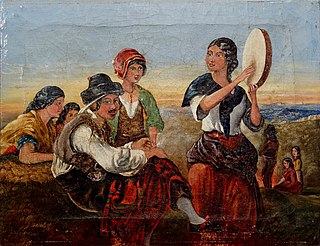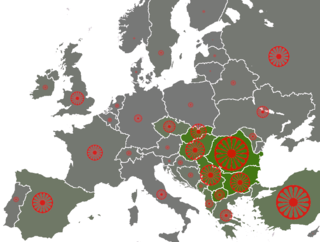
The Romani, also spelled Romany or Rromani and colloquially known as the Roma, are an ethnic group of Indo-Aryan origin who traditionally lived a nomadic, itinerant lifestyle. Linguistic and genetic evidence suggests that the Romani originated in the Indian subcontinent, in particular the region of present-day Rajasthan. Their subsequent westward migration, possibly in waves, is now believed by historians to have occurred around 1000 CE. Their original name is from the Sanskrit word डोम, ḍoma and means a member of the Dom caste of travelling musicians and dancers. The Roma population moved west into the Ghaznavid Empire and later into the Byzantine Empire. The Roma are thought to have arrived in Europe around the 13th to 14th century. Although they are widely dispersed, their most concentrated populations are located in Bulgaria, Hungary, Romania, Spain, and Turkey.
Quinqui jargon is associated with quincalleros, semi-nomadic people who live mainly in the northern half of Spain. They prefer to be called mercheros. They are reduced in number and possibly vanishing as a distinct group.

Lívia Járóka is a Hungarian politician. She is a Member of the European Parliament, first elected as part of the Fidesz list in 2004. Járóka is the second Romani ever elected to the European Parliament.
There are independent groups currently working toward standardizing the Romani language, including groups in Romania, Serbia, the United States and Sweden.

The Romani in Spain, generally known by the endonym Calé, or the exonym gitanos, belong to the Iberian Romani subgroup known as Calé, with smaller populations in Portugal and in Southern France. Their sense of identity and cohesion stems from their shared value system, expressed among gitanos as las leyes gitanas.

Human rights in Spain are set out in the 1978 Spanish constitution. Sections 6 and 7 guarantees the right to create and operate political parties and trade unions so long as they respect the Constitution and the law.
In Romani culture, a gadjo (masculine) or gadji (feminine) is a person who has no Romanipen. This usually corresponds to not being an ethnic Romani, but it can also be an ethnic Romani who does not live within Romani culture. It is often used by Romanies to address or denote outsider neighbors living within or very near their community.

"Amor Gitano" is a Latin pop duet recorded by Mexican singer Alejandro Fernández and American singer Beyoncé. The song contains a mixture of cultures, mostly influenced by the language of Fernández, that is Spanish, and Beyoncé's pop and R&B influences. Along with Jaime Flores and Reyli Barba, Beyoncé wrote the song, while Rudy Pérez and Beyoncé herself produced the song. "Amor Gitano" serves as the theme song of the telenovela El Zorro and it was released on February 12, 2007, during the premiere of the episode of the telenovela.

The Romani people have several distinct populations, the largest being the Roma and the Calé, who reached Anatolia and the Balkans in the early 12th century, from a migration out of the Indian subcontinent beginning about 1st century – 2nd century AD. They settled in the areas of present-day Turkey, Greece, Serbia, Romania, Croatia, Moldova, Bulgaria, North Macedonia, Hungary, Albania, Kosovo, Bosnia and Herzegovina, Czech Republic, Slovenia and Slovakia, by order of volume, and Spain. From the Balkans, they migrated throughout Europe and, in the nineteenth and later centuries, to the Americas. The Roma population in the United States is estimated at more than one million.

Roberto Sánchez-Ocampo, better known by his stage names Sandro or Sandro de América, was an Argentine singer and actor. He is considered a pioneer of Argentine rock for being one of the first rock artists to sing in Spanish in Latin America. He edited 52 official records and sold eight million copies although other sources state that he sold over 10 million. Some of his most successful songs are "Dame fuego", "Rosa, Rosa", "Quiero llenarme de ti", "Penumbras", "Porque yo te amo", "Así", "Mi amigo el Puma", "Tengo", "Trigal", and "Una muchacha y una guitarra". The single "Rosa, Rosa" sold two million copies, being his most recognizable and famous song. Another of his hits, "Tengo" was given 15th place among the 100 best Argentine rock songs by both MTV and Rolling Stone magazine. In Latin America he was often compared to Elvis Presley at the height of his popularity.
The Romani people are known by a variety of names, mostly under the broad categories of gipsy, tsinganoi, Bohémiens, and Roma. Self-designation varies: In Central and Eastern Europe, Roma is common. The Romani of England call themselves Gypsies, Romanies, Romany Gypsies or Romanichal, those of Scandinavia Romanisæl. In German-speaking Europe, the self-designation is Sinti, in France Manush, while the groups of Spain, Wales, and Finland use Kalo/Kale. There are numerous subgroups and clans with their own self-designations, such as the Kalderash, Machvaya, Boyash, Lovari, Modyar, Xoraxai, and Lăutari.

Erromintxela is the distinctive language of a group of Romani living in the Basque Country, who also go by the name Erromintxela. It is sometimes called Basque Caló or Errumantxela in English; caló vasco, romaní vasco, or errominchela in Spanish; and euskado-rromani or euskado-romani in French. Although detailed accounts of the language date to the end of the 19th century, linguistic research began only in the 1990s.

The Great Gypsy Round-up, also known as the general imprisonment of the Gypsies, was a raid authorized and organized by the Spanish Monarchy that led to the arrest of most Roma in the region and the genocide of 12,000 Romani people. Although a majority were released after a few months, many others spent several years imprisoned and subject to forced labor. The raid was approved by the King Ferdinand VI of Spain, and organized by the Marquis of Ensenada, and set in motion simultaneously across Spain on 30 July 1749.

Romani people in Germany are estimated to around 170,000-300,000, constituting around 0.2-0.4% of the population. One-third of Germany Romani belong to the Sinti group. Most speak German or Sinte Romani.
The Romani people in Brazil are known by non-Romani Brazilians as ciganos, or alternatively by terms such as boêmios, judeus and quicos, in various degrees of accuracy of use and etymology as well as linguistic prestige.
There is a significant Roma population in Mexico, most being the descendants of past migrants. According to data collected by the National Institute of Statistics and Geography in 2000, they numbered 15,850, however, the total number is likely larger. In Mexico, they are commonly known as gitanos or rom.
Romani people in Algeria historically included Gitanos who migrated there along with other Spanish people in the late 19th century, during the French colonial period; most of these left for France following Algeria's independence in 1962, resulting in a large community in the South of France. Ratcliffe (1933) describes a Gitano encampment on the heights above Algiers, whose Catholic inhabitants sold lace and mended chairs. Notable descendants of the Gitanos who used to live in Algeria include the film-maker Tony Gatlif and the footballer André-Pierre Gignac.
There is a small Roma population in Uruguay, most being the descendants of previous migrants. According to data available they number c. 400.

Romani feminism or Gypsy feminism is the feminist trend that promotes gender equality, the fight against social inequalities and the defense of the integration of women in different movements in society, making these processes compatible with the preservation of culture and values of the Romani people.











